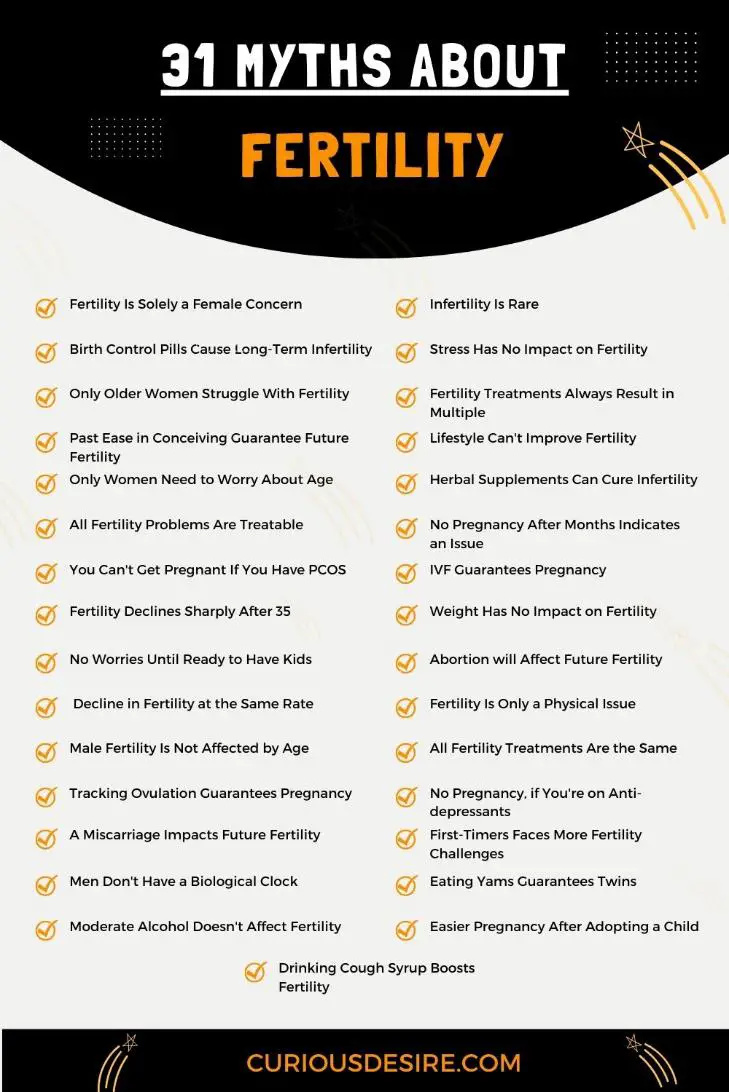Fertility, the complex interplay of biology and human life, has long been surrounded by myths and misconceptions that shape societal perceptions and influence personal decisions.
In this article, we are gearing up to debunk these myths about fertility, thereby freeing people, especially women, from various misconceptions that may have influenced their understanding.
5 Most Common Myths About Fertility:
- Fertility Is Solely a Female Concern
- All Fertility Problems Are Treatable
- Experiencing a Miscarriage Negatively Impacts Future Fertility
- Stress Has No Impact on Fertility
- If You’re Not Pregnant After a Few Months, Something Is Wrong
[toc]

Myth 1: Fertility Is Solely a Female Concern
Origins of the Myth:
Throughout history, the narrative around fertility has unfairly burdened women by portraying reproductive issues as solely their responsibility. This perspective, rooted in traditional gender roles, has overshadowed the equally significant role that men play in the process of conception.
Dispelling the Myth:
The reality is that fertility is a shared responsibility between both partners. Dismissing this myth is not just a correction of a historical misconception but a crucial step toward encouraging open communication and mutual support in navigating the intricate journey of fertility.
Understanding and addressing fertility concerns collectively leads to a more informed and supportive approach to conception.
Myth 2: Infertility Is Rare
Origins of the Myth:
Infertility is often kept private due to its personal and sensitive nature, leading to the mistaken idea that it’s a rare issue.
The tendency to keep these challenges hidden in society continues to reinforce this misconception.
Dispelling the Myth:
Contrary to popular belief, infertility is a prevalent concern affecting approximately 1 in 8 couples.
It’s essential to break the silence around fertility struggles, promote open conversations, and create a supportive community where individuals feel at ease discussing their reproductive health.
Myth 3: Birth Control Pills Cause Long-Term Infertility
Origins of the Myth:
The fear that birth control pills may lead to long-term infertility could stem from a misunderstanding of how these contraceptives work.
Dispelling the Myth:
Scientific evidence consistently supports the fact that birth control pills do not cause lasting infertility. Understanding this reality empowers individuals to make informed decisions about family planning without unnecessary anxiety about future fertility.
Moreover, exploring various contraceptive methods and their impacts can provide a comprehensive perspective on reproductive health.
Myth 4: Stress Has No Impact on Fertility
Origins of the Myth:
The belief that stress doesn’t affect fertility may arise from the assumption that reproduction is solely a biological process unaffected by emotional and psychological factors.
Dispelling the Myth:
Scientific studies highlight a significant correlation between stress and fertility issues. It can influence hormonal balance, disrupt menstrual cycles, and impact fertility.
But it’s very important to understand that stress alone may not be the sole cause of infertility.
However, managing stress is crucial for overall well-being and may positively contribute to reproductive health.
Exploring stress-reduction techniques and incorporating them into daily life can be beneficial for those trying to conceive.
Myth 5: Only Older Women Struggle With Fertility
Origins of the Myth:
The narrative surrounding the “biological clock” often emphasizes the age-related decline in fertility, leading to the misconception that only older women face challenges in conceiving.
Dispelling the Myth:
Fertility concerns are not exclusive to older women. While it’s true that fertility declines with age, even women in their 20s may face challenges.
Dispelling this myth encourages proactive family planning and eliminates the notion that age alone guarantees fertility.
Understanding the impact of age on fertility allows individuals to make informed decisions about when to start a family.
Myth 6: Fertility Treatments Always Result in Multiple
Origins of the Myth:
Media portrayals and anecdotal stories often exaggerate the likelihood of multiple births through fertility treatments, creating a misconception that this outcome is inevitable.
Dispelling the Myth:
Advances in reproductive medicine have allowed for more precise control over the number of embryos implanted during fertility treatments, reducing the likelihood of multiple pregnancies.
It is essential to inform individuals about the advancements in fertility treatments, assuaging fears, and ensuring a safer outcome for both the mother and the potential children.
Myth 7: If You Had a Child Easily Before, You’ll Have No Trouble Again
Origins of the Myth:
Limited awareness about the complexity of fertility issues and the various factors influencing reproductive health can contribute to the misconception that past ease in conceiving guarantees future success.
Dispelling the Myth:
Each pregnancy and fertility journey is unique, and factors such as age, health conditions, and lifestyle changes can impact fertility differently with each attempt, even if previous pregnancies occurred without difficulty.
Myth 8: You Can’t Improve Fertility With Lifestyle Changes
Origins of the Myth:
Some may believe that fertility is solely determined by biological factors, overlooking the significant impact that lifestyle choices can have on reproductive health.
Dispelling the Myth:
Research consistently supports the idea that adopting a healthy lifestyle can positively influence fertility.
Maintaining a balanced diet, regular exercise, and managing stress contribute to overall well-being, promoting optimal conditions for conception.
Myth 9: Only Women Need to Worry About Age and Fertility
Origins of the Myth:
The emphasis on female age and fertility in popular discourse may lead to the misconception that male age is not a significant factor in reproductive health.
Dispelling the Myth:
Research indicates that advanced paternal age can also impact fertility and increase the risk of certain genetic conditions.
Recognizing the role of male age in fertility allows for a more comprehensive understanding of reproductive health for both partners.
Myth 10: Herbal Supplements Can Cure Infertility
Origins of the Myth:
The popularity of natural remedies and herbal supplements for various health concerns may lead individuals to believe that these substances can cure infertility.
Dispelling the Myth:
While some herbal supplements may have positive effects on overall health, there is limited scientific evidence supporting their efficacy in treating infertility.
It’s crucial to consult with healthcare professionals to explore evidence-based treatment options.
Fertility Myths FAQs
1. What Are the 5 Causes of Infertility?
- Ovulation Disorders: Irregular or absent ovulation can hinder conception.
- Male Factors: Issues with sperm quality, quantity, or motility.
- Age-Related Factors: Fertility declines with age, impacting both men and women.
- Uterine or Tubal Issues: Conditions affecting the reproductive organs can impede conception.
- Endocrine Disorders: Hormonal imbalances can disrupt the reproductive system.
2. When Can a Woman Not Get Pregnant?
A woman is less likely to conceive when she is not ovulating, during menstruation, and in the post-menopausal stage.
Additionally, women using effective contraception methods, such as birth control pills or intrauterine devices, are not in a fertile state.
3. What Are Safe Days?
Safe days refer to the period in a woman’s menstrual cycle when pregnancy is less likely to occur.
These typically include the days immediately before and after menstruation, although the effectiveness of this method can vary.
It’s important to note that using the calendar method alone may not be a reliable form of contraception.
4. How Do I Know If I’m Fertile?
Signs of fertility include regular menstrual cycles, changes in cervical mucus consistency, basal body temperature fluctuations, and ovulation pain.
However, the most accurate way to assess fertility is through medical evaluations such as hormonal tests and fertility assessments conducted by healthcare professionals.
5. How Do I Check My Fertility at Home?
Home fertility checks may include tracking basal body temperature, monitoring changes in cervical mucus, and using ovulation predictor kits.
However, for a comprehensive assessment, consulting a healthcare professional for hormonal tests, ultrasound examinations, and other diagnostic procedures is recommended.
6. How to Conceive Fast?
To increase the chances of conception quickly:
- Track Ovulation: Understand your menstrual cycle and identify fertile days.
- Maintain a Healthy Lifestyle: Eat well, exercise regularly, and manage stress.
- Timing Intercourse: Have regular, timed intercourse during fertile windows.
- Preconception Health: Ensure both partners are in good health.
- Limit Caffeine and Alcohol: Excessive consumption may impact fertility.
It’s essential to consult with a healthcare professional for personalized advice based on individual health conditions.


